Green Growth for Zambia
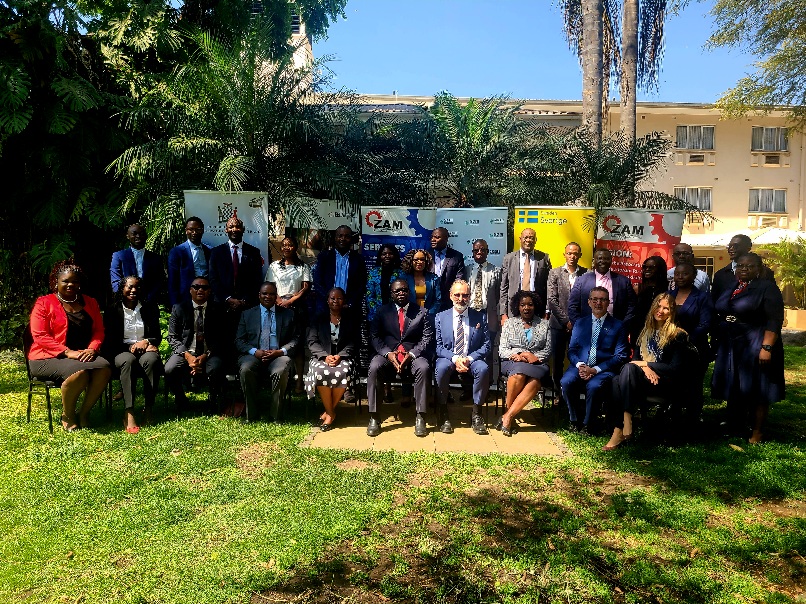 Chipoka says the EELA project will promote energy efficiency, sustainable industrialization, and job creation across all provinces, supporting low-carbon growth and Zambia’s long-term development goals.
Chipoka says the EELA project will promote energy efficiency, sustainable industrialization, and job creation across all provinces, supporting low-carbon growth and Zambia’s long-term development goals.By Francis Maingaila ♥️
Lusaka, Zambia24 – (03-09-2025) - Zambia has launched the Energy Efficiency for Sustainable Livelihoods in Africa (EELA) Zambia Country Window Project, a strategic initiative aimed at promoting industrial growth, job creation, and environmental sustainability.
Zambia has faced persistent energy challenges over the past decade, with frequent power deficits affecting households, industries, and essential services.
The country relies heavily on hydroelectric power, making it vulnerable to climate variability and drought. These energy constraints have contributed to reduced industrial productivity, increased production costs, and slow economic growth.
The EELA project emerges against this backdrop, aiming to optimize energy use, reduce reliance on costly and inefficient power consumption, and support sustainable industrialisation.
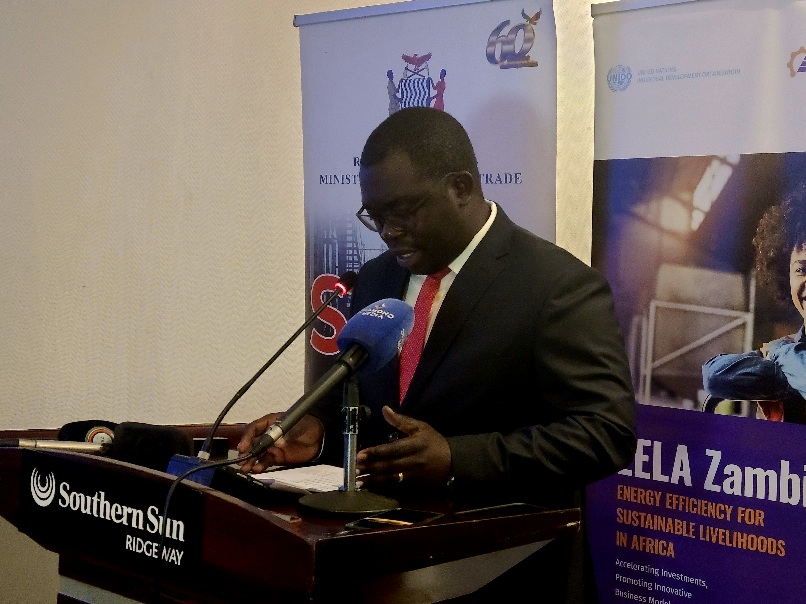
Chipoka Mulenga, Minister of Commerce, Trade and Industry, representing the Minister of Energy, described the project as both timely and transformative given the country’s current energy challenges.
“This initiative is not only a technical project but a crucial driver of economic growth. Energy efficiency has become a cornerstone of our industrial transformation, and the EELA project will support sustainable growth, job creation, and wealth generation,” he said.
Mulenga explained that the project aligns with the Eighth National Development Plan (8NDP) and Vision 2030.
“Energy efficiency is now a cornerstone of our industrial and trade transformation, particularly as Zambia continues to face energy supply constraints,” he added.
He also praised development partners, including the Swedish government, for their consistent support in promoting sustainable energy solutions.
The EELA Project addresses two major challenges: high energy demand amid limited supply, and reduced productivity in the manufacturing and commercial sectors.
Mulenga emphasized that the project must reach all provinces, including the Copperbelt, Eastern, Southern, Muchinga, Northwestern, and Northern regions.
“EELA’s focus on energy efficiency and sustainable practices must be understood and embraced nationwide,” he said.
He highlighted that the project will promote energy-efficient technologies in key sectors such as agro-processing, support local production of efficient appliances, and build skills for their maintenance and safe disposal.
Industrial energy assessments will guide the transition to low-carbon production processes.
Mulenga urged citizens to adopt proper disposal and management of electronic and energy-consuming devices to prevent environmental and health hazards.
He added that EELA will encourage private sector participation through the Industry Clean-Tech Platform, provide blended financing for companies adopting energy-efficient technologies, and support the development of the Energy Service Companies (ESCO) market, which delivers innovative energy solutions for industries.
The project will also strengthen minimum energy performance standards (MEPS) and regulatory frameworks, enhance quality assurance, and align Zambian products with SADC, COMESA, and international standards—boosting both regional and international trade.
Mulenga noted that the initiative seeks to advance regional integration, particularly under the African Continental Free Trade Area (AfCFTA).
“By ensuring our products meet high-quality, energy-efficient, and sustainable standards, we position Zambia to trade competitively while protecting the environment,” he said.
He stressed that EELA will contribute to environmental sustainability by reducing industrial carbon emissions, promoting electronic-waste management, and supporting circular economy practices.
The initiative is fully aligned with Zambia’s climate resilience commitments and the Sustainable Development Goals (SDGs).
Following the launch, the EELA Project Steering Committee (PSC) will hold its inaugural meeting to provide strategic direction, coordinate interventions, and ensure alignment with national and regional priorities under the SADC framework.
Mulenga encouraged manufacturers and stakeholders to view the project as a long-term commitment to sustainable growth rather than a one-off initiative.
“Energy efficiency is not just a technical issue; it is an economic opportunity, a social imperative, and an environmental necessity. The time for action is now,” Mulenga said.
He officially launched the EELA Zambia Country Window Project, marking the start of a nationwide effort to build a resilient, competitive, and sustainable economy.
The launch underscores Zambia’s commitment to sustainable industrialisation and energy-efficient trade practices as part of its long-term economic growth strategy.
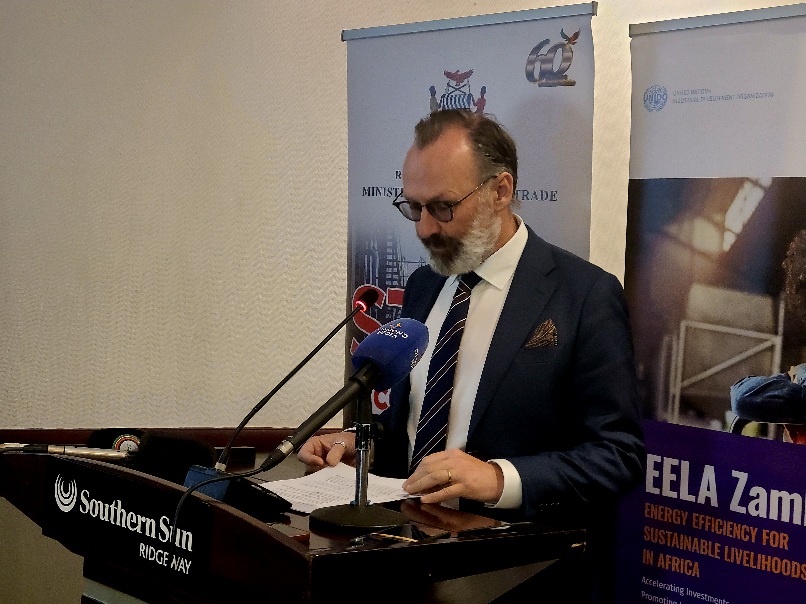
Swedish Ambassador to Zambia, Johan Hallenborg, said his government pledged €5.2 million over four years to support Zambia’s energy efficiency efforts through the EELA initiative, which aims at promoting sustainable development and low-carbon industrial transformation.
Hallenborg described energy efficiency as a “development imperative” essential for economic growth, environmental protection, and improving Zambians’ quality of life.
“The EELA project is not just a technical intervention. It is about building resilient economies, creating jobs, and fostering innovation through public-private partnerships,” Hallenborg said.
The initiative will increase the use of energy-efficient appliances through national policy support, capacity building, and private sector development.
A key component is the Industrial Cleantech Platform, which will accelerate investment in low-carbon industrial technologies and strengthen skills in repair, maintenance, and e-waste management.
Hallenborg highlighted that the public-private partnership model allows government institutions to set regulatory standards while enabling private sector actors to deliver market-driven solutions.
“This approach drives market transformation, fosters technology transfer, and aligns clean technologies with national development goals,” he said.
Zambia’s Energy Efficiency Strategy and Action Plan provides the framework for the initiative, aiming to reduce primary energy intensity by 2030, promote energy-efficient appliances, and encourage industrial energy audits and management systems.
While Sweden’s policies are shaped by EU climate targets and industrial decarbonization, Zambia focuses on energy access and reducing losses in the energy value chain.
Both countries are committed to international cooperation under Article 6 of the Paris Agreement, which supports joint climate projects and emissions trading.
“The project enables shared expertise, drives market transformation, fosters innovation, and supports job creation,” Hallenborg said.
“It also reduces greenhouse gas emissions and improves e-waste management, ensuring environmental goals are met without compromising economic development.”
Hallenborg concluded by emphasizing that energy efficiency is a cornerstone for sustainable development and expressed optimism that Zambia’s energy future is already taking shape through collaboration and innovation.
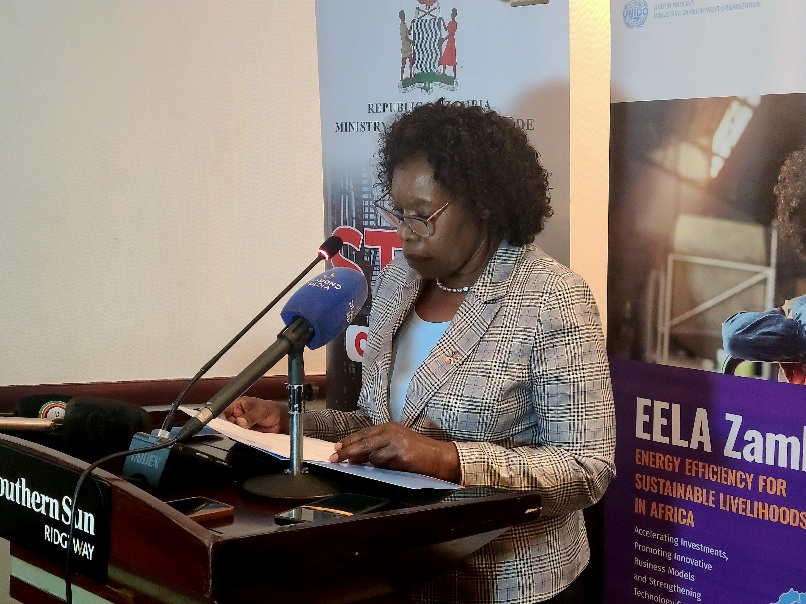
And UN Resident Coordinator in Zambia, Ms. Beatrice M. Mutali, said the programme aligns with the United Nations Sustainable Development Cooperation Framework (2023–2027) and Zambia’s 8th National Development Plan.
“EELA demonstrates how a single initiative can deliver across four strategic pillars—People, Planet, Prosperity, and Peace—by improving energy efficiency, strengthening industrial competitiveness, and enhancing livelihoods, particularly for women and young people,” she said.
Mutali highlighted Zambia’s challenge of meeting growing energy demand while ensuring a low-carbon transition.
She said EELA promotes energy-efficient appliances, supports policy and regulatory frameworks, and encourages clean technologies in industries.
“This programme is a systemic shift toward sustainable practices, accelerating progress on the Sustainable Development Goals,” she said.
The initiative will contribute directly to SDG 7 (Affordable and Clean Energy), SDG 9 (Industry, Innovation, and Infrastructure), and SDG 13 (Climate Action).
By lowering energy costs for households and businesses, it aims to reduce poverty, support local value chains, and strengthen community resilience.
Led by the United Nations Industrial Development Organization (UNIDO), EELA brings together the Government of Zambia, the Swedish Energy Agency, Sida, SACREEE, and the private sector.
Mutali emphasized the importance of collaboration, quoting the African proverb: “If you want to go fast, go alone; if you want to go far, go together.”
She commended the leadership of the Ministry of Energy, the Ministry of Commerce and Trade, and the Zambia Association of Manufacturers during the programme’s inception and thanked the Government of Sweden for its support.
Mutali urged all stakeholders—including government, private sector, civil society, and development partners—to actively engage in the programme’s implementation.
“Let us ensure that the benefits of energy efficiency reach every corner of Zambia, from urban industries to rural households,” she said.
Mutali concluded by reaffirming the UN’s commitment to advancing reliable, affordable, and sustainable energy as central to building inclusive and resilient industrial development.
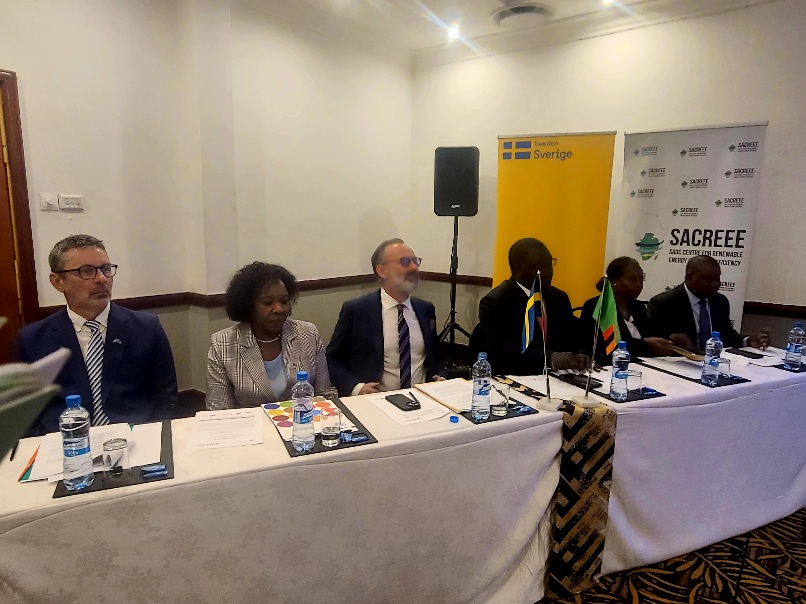
Speaking earlier, Ellin Karlsson, Industrial Development Expert at the United Nations Industrial Development Organization (UNIDO), said energy efficiency reduces costs, conserves scarce resources, and helps meet international climate targets.
“Energy can be expensive when inefficient appliances dominate the market. Strong policies and regulations are essential to attract investment and ensure access to high-quality, energy-efficient products,” she said.
The project focuses on three key areas: accelerating the adoption of high-performing energy-efficient appliances, supporting private sector energy efficiency investments, and promoting sustainable local value chains for energy-efficient products and services.
In Zambia, EELA will target both grid-connected and off-grid appliances, initially focusing on agro-processing, manufacturing, and mining sectors.
A private sector platform will serve as a one-stop center for companies transitioning to sustainable technologies, providing access to financing solutions and technical support.
Skills development is also central, with training for maintenance, lifecycle management, and safe disposal of energy-efficient technologies.
The four-year project is supported by the Swedish government through the Swedish International Development Agency (Sida) with a budget of USD 5.2 million.
Zambia’s EELA country window is part of a broader regional program, which also includes Zimbabwe and Kenya.
Karlsson urged industries and policymakers to embrace energy-efficient solutions to maximize both economic and environmental benefits.



Comments
Post a Comment